Related Research Articles

The University of California,Berkeley,is a public land-grant research university in Berkeley,California. Established in 1868 as the University of California,it is the state's first land-grant university and the founding campus of the University of California system. Its fourteen colleges and schools offer over 350 degree programs and enroll some 31,800 undergraduate and 13,200 graduate students. Berkeley ranks among the world's top universities.
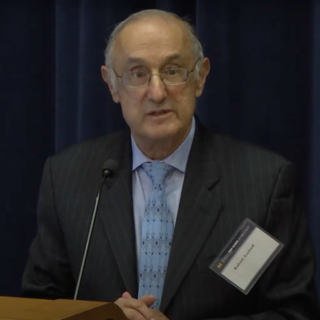
Robert Marshall Axelrod is an American political scientist. He is Professor of Political Science and Public Policy at the University of Michigan where he has been since 1974. He is best known for his interdisciplinary work on the evolution of cooperation. His current research interests include complexity theory,international security,and cyber security. His research includes innovative approaches to explaining conflict of interest,the emergence of norms,how game theory is used to study cooperation,and cross-disciplinary studies on evolutionary processes.

Richard Manning Karp is an American computer scientist and computational theorist at the University of California,Berkeley. He is most notable for his research in the theory of algorithms,for which he received a Turing Award in 1985,The Benjamin Franklin Medal in Computer and Cognitive Science in 2004,and the Kyoto Prize in 2008.

The UC Berkeley College of Chemistry is one of 14 schools and colleges at the University of California,Berkeley. It houses the departments of Chemistry,Chemical and Biomolecular Engineering,and Chemical Biology and occupies six buildings flanking a central plaza.
The Walter A. Haas School of Business,also known as Berkeley Haas,is the business school of the University of California,Berkeley,a public research university in Berkeley,California. It was the first business school at a public university in the United States and is ranked among the best business schools in the world by The Economist,Financial Times,QS World University Rankings,U.S. News &World Report,and Bloomberg Businessweek.

David Jonathan Gross is an American theoretical physicist and string theorist. Along with Frank Wilczek and David Politzer,he was awarded the 2004 Nobel Prize in Physics for their discovery of asymptotic freedom. Gross is the Chancellor's Chair Professor of Theoretical Physics at the Kavli Institute for Theoretical Physics (KITP) of the University of California,Santa Barbara (UCSB),and was formerly the KITP director and holder of their Frederick W. Gluck Chair in Theoretical Physics. He is also a faculty member in the UCSB Physics Department and is currently affiliated with the Institute for Quantum Studies at Chapman University in California. He is a foreign member of the Chinese Academy of Sciences.
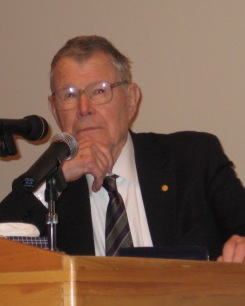
Thomas Crombie Schelling was an American economist and professor of foreign policy,national security,nuclear strategy,and arms control at the School of Public Policy at University of Maryland,College Park. He was also co-faculty at the New England Complex Systems Institute. He was awarded the 2005 Nobel Memorial Prize in Economic Sciences for "having enhanced our understanding of conflict and cooperation through game-theory analysis."

Deterrence theory refers to the scholarship and practice of how threats or limited force by one party can convince another party to refrain from initiating some other course of action. The topic gained increased prominence as a military strategy during the Cold War with regard to the use of nuclear weapons and is related to but distinct from the concept of mutual assured destruction,according to which a full-scale nuclear attack on a power with second-strike capability would devastate both parties. The central problem of deterrence revolves around how to credibly threaten military action or nuclear punishment on the adversary despite its costs to the deterrer.

The Graduate Theological Union (GTU) is a consortium of eight private independent American theological schools and eleven centers and affiliates. Seven of the theological schools are located in Berkeley,California. The GTU was founded in 1962 and their students can take courses at the University of California,Berkeley. Additionally,some of the GTU consortial schools are part of other California universities such as Santa Clara University and California Lutheran University. Most of the GTU consortial schools are located in Berkeley area with the majority north of the campus in a neighborhood known as "Holy Hill" due to the cluster of GTU seminaries and centers located there.

John Joseph Mearsheimer is an American political scientist and international relations scholar,who belongs to the realist school of thought. He is the R. Wendell Harrison Distinguished Service Professor at the University of Chicago. He has been described as the most influential realist of his generation.

Robert Jervis was an American political scientist who was the Adlai E. Stevenson Professor of International Politics in the Department of Political Science at Columbia University. Jervis was co-editor of the Cornell Studies in Security Affairs,a series published by Cornell University Press.
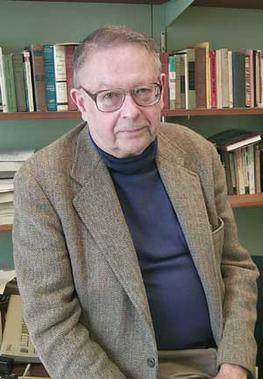
Kenneth Neal Waltz was an American political scientist who was a member of the faculty at both the University of California,Berkeley and Columbia University and one of the most prominent scholars in the field of international relations. He was a veteran of both World War II and the Korean War.
Robert L. Gallucci is an American academic and diplomat,who formerly worked as president of the John D. and Catherine T. MacArthur Foundation. He previously served as dean of the Edmund A. Walsh School of Foreign Service at Georgetown University,from 1996 to June 2009. Prior to his appointment in 1996,for over two decades he had served in various governmental and international agencies,including the Department of State and the United Nations.
Neil Joseph Smelser (1930–2017) was an American sociologist who served as professor of sociology at the University of California,Berkeley. He was an active researcher from 1958 to 1994. His research was on collective behavior,sociological theory,economic sociology,sociology of education,social change,and comparative methods. Among many lifetime achievements,Smelser "laid the foundations for economic sociology."

Albert W. Overhauser was an American physicist and a member of the National Academy of Sciences. He is best known for his theory of dynamic nuclear polarization known as the Overhauser Effect in nuclear magnetic resonance spectroscopy.
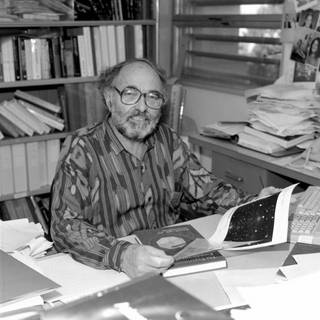
Gerson Goldhaber was a German-born American particle physicist and astrophysicist. He was one of the discoverers of the J/ψmeson which confirmed the existence of the charm quark. He worked at Lawrence Berkeley National Laboratory with the Supernova Cosmology Project,and was a professor of physics at the University of California,Berkeley as well as a professor at Berkeley's graduate school in astrophysics.
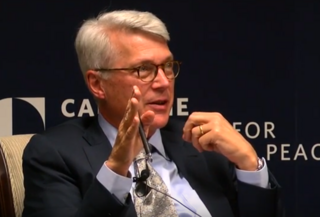
Scott Douglas Sagan is the Caroline S.G. Munro Professor of Political Science at Stanford University and co-director of Stanford's Center for International Security and Cooperation (CISAC). He is known for his research on nuclear weapons policy and nuclear disarmament,including discussions of system accidents,and has published widely on these subjects.
The William and Katherine Estes Award,previously known as the NAS Award for Behavioral Research Relevant to the Prevention of Nuclear War is awarded by the U.S. National Academy of Sciences "to recognize basic research in any field of cognitive or behavioral science that has employed rigorous formal or empirical methods,optimally a combination of these,to advance our understanding of problems or issues relating to the risk of nuclear war". It was first awarded in 1990.
Compellence is a form of coercion that attempts to get an actor to change its behavior through threats to use force or the actual use of limited force. Compellence can be more clearly described as "a political-diplomatic strategy that aims to influence an adversary's will or incentive structure. It is a strategy that combines threats of force,and,if necessary,the limited and selective use of force in discrete and controlled increments,in a bargaining strategy that includes positive inducements. The aim is to induce an adversary to comply with one's demands,or to negotiate the most favorable compromise possible,while simultaneously managing the crisis to prevent unwanted military escalation."
References
- 1 2 3 4 Fearon, James D.; Lake, David A.; Meng, Anne; Paine, Jack (2022). "In Memoriam: Robert L. Powell". International Organization: 1–2. doi: 10.1017/S0020818322000091 . ISSN 0020-8183. S2CID 248764307.
- ↑ "Robert Powell". haas.berkeley.edu. Retrieved March 22, 2021.
- 1 2 Maclay, Kathleen (January 19, 2012). "NAS honors Robert Powell's work on nuclear deterrence". news.berkeley.edu. Retrieved March 22, 2021.
- ↑ Malkasian, Carter (2022-01-31). "Master of Deterrence". Foreign Affairs. ISSN 0015-7120 . Retrieved 2022-02-01.
- ↑ "Six professors named to American Academy of Arts and Sciences". berkeley.edu. April 28, 2005. Retrieved March 22, 2021.
- ↑ "Two faculty honored for their exemplary service to the campus". news.berkeley.edu. February 7, 2018. Retrieved March 22, 2021.